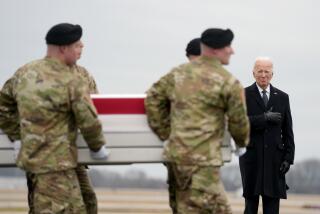10 killed as U.S. raids Sadr City
- Share via
BAGHDAD — U.S.-led forces battled gunmen in Sadr City during two rare forays into the vast Shiite Muslim slum Wednesday, killing at least 10 people and drawing a swift rebuke from Iraq’s prime minister.
The American troops, who called in airstrikes as they came under attack, were searching for a kidnapped U.S. soldier and hunting for a Shiite death-squad leader, authorities said.
The U.S. military said in a statement that the action had been authorized by the Iraqi government. But Prime Minister Nouri Maliki, a Shiite, quickly renounced the operation, telling reporters at a news conference that it was an example of a continuing lack of coordination between Iraqi and U.S.-led troops.
“We are going to request some explanations from the multinational forces to prevent a similar incident, and to ensure coordination with the Iraqi security forces,” Maliki said.
The prime minister distanced himself further from the U.S. by rebuffing talk this week by President Bush and his ambassador to Iraq of the establishment of timelines for the Iraqi government to solve some of the country’s most intractable issues, including how to disarm militias, revenue sharing and de-Baathification, or the removal and exclusion of former members of Saddam Hussein’s Baath Party from government posts.
“This government is one of popular will and national unity, and it is nobody’s right to put timetables before it,” Maliki said, suggesting such efforts have more to do with the upcoming U.S. midterm election than with the situation on the ground in Iraq.
On Tuesday, U.S. Ambassador Zalmay Khalilzad told reporters that the Iraqi government had agreed to a series of benchmarks by which it should solve key issues. The remarks about such a timetable came during a news conference with the top U.S. military commander in Iraq, Army Gen. George W. Casey Jr.
The military on Wednesday issued a clarification of a remark during the news conference by Casey.
The general had said, with respect to holding and rebuilding Baghdad neighborhoods: “Do we need more troops to do that? Maybe.” He also repeated an earlier estimate that it would be an additional 12 to 18 months before Iraqi security forces could take over from U.S. forces.
In its statement, the military said that “there is no intent to bring more U.S. troops into Iraq at this time. The general was merely saying ... that all options are on the table.”
Maliki also went out of his way to praise the anti-American Shiite cleric, Muqtada Sadr, for seemingly rejecting violence against other Muslims.
Sadr has not renounced killing American troops, and U.S. commanders in Iraq have expressed a belief that Sadr’s Al Mahdi militia is behind most attacks against U.S. troops.
October has been the deadliest month of the year so far for U.S. forces, with at least 91 American troops killed.
Maliki has been under pressure from the U.S. to rein in Shiite militias, most notably Sadr’s Al Mahdi army, but the prime minister relies on the young cleric for political support. In addition to nominally leading the largest Shiite militia in Iraq, Sadr controls 30 seats in parliament.
In Wednesday’s operation in Sadr City, troops set out to capture a “top illegal armed group commander directing widespread death-squad activity throughout eastern Baghdad,” the U.S. military said in a statement. It was unclear whether they caught the commander.
Around 3 a.m., U.S.-led troops entered a neighborhood on the outskirts of the slum, according to witnesses who said that attack aircraft struck houses, roads and a generator, and that troops on foot cut electrical wires.
“They want to drag us to a war with them,” said Ahmed Hawki, 40, adding that the Iraqi government is unable to provide adequate security for him and his relatives.
Ali Habib, a 33-year-old photographer, also said the raid was a provocation.
“If they want to detain someone they don’t have to use such barbaric methods -- intimidating the women and children” in the middle of the night, he said.
Felah Shanshal, a Sadr associate, said members of the cleric’s political bloc “appeal to the Iraqi government to present a suitable explanation to what has happened today.”
The Sadr movement considered the operation a “blatant violation of the alleged sovereignty” of the Iraqi government, Shanshal said.
This week, many Iraqi families are gathered at home to celebrate Eid al-Fitr, the most festive holiday on the Muslim calendar. The holy month of Ramadan, which just ended, was marked by increased brutality and bloodshed.
Last week, Sadr militiamen clashed with Iraqi police in the southern city of Amarah for two days, in effect laying siege to the city as bands of gunmen raided the streets, blowing up several police stations.
Sadr sent a special envoy, Abdul Mohammedawi, to the city to negotiate with authorities. Local police forces are dominated by a competing Shiite militia affiliated with the Supreme Council for Islamic Revolution in Iraq, the nation’s largest Shiite party, which has links to Iran.
Amarah is under a nighttime curfew.
North of Baghdad in Baqubah, police said a car bomber killed two people in an attack on a police checkpoint.
In Husaybah on the western border with Syria, three people were killed when explosives blew up in the vehicle they were driving Tuesday, according to the U.S. military.
*
Times staff writer Raheem Salman in Baghdad and
special correspondent Saad Fakhrildeen in Najaf contributed to this report.
More to Read
Sign up for Essential California
The most important California stories and recommendations in your inbox every morning.
You may occasionally receive promotional content from the Los Angeles Times.












